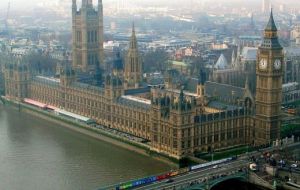MercoPress. South Atlantic News Agency
British Parliament clean up bill has received Royal Assent
 The MPs expenses scandal cost many benches and cabinet resignations
The MPs expenses scandal cost many benches and cabinet resignations A bill aimed at cleaning up Parliament after the MPs' expenses scandal has become law after getting Royal Assent. Just weeks after the Parliamentary Standards Bill was introduced, it is now on the statute book after a series of concessions by the government.
The bill, which sets up an independent body to authorise MPs' expenses, was criticised by many MPs and peers for being rushed through. Ministers said it was vital the bill became law before the summer recess.
They said speedy approval was imperative for rebuilding public confidence in how Parliament works as MPs prepare to leave Westminster for their constituencies.
When the bill was introduced it included provisions for three new criminal offences for MPs, a wide-ranging legally binding code of conduct for MPs and was expected to apply eventually to peers as well as MPs.
But as it returned to the Commons on Tuesday - two of the proposed offences have been dropped, as has the code of conduct while peers have been assured “categorically” it would not apply to them.
And a move to allow MPs' words in the Commons - now protected by Parliamentary privilege - to be used against them in court was rejected after a surprise Commons defeat for the government.
In Tuesday's debate on amendments made in the House of Lords Justice Secretary Jack Straw faced accusations the bill had been rushed through for “public relations purposes” and had since been “emasculated”.
Mr Straw said “improvements” had been made to the bill and the three main parties had backed plans for a new Parliamentary Standards Authority but they had to work “from a standing start”.
He said it had been a difficult process and he would have been condemned if he had resisted making changes.
“I think we have achieved a very much better measure as a result,” he said.
In a later interview, Mr Straw said the new authorisation process for expenses, combined with full transparency in the disclosure of claims, would mean past abuses could not happen again.
“Thankfully the expenses scandals will be a thing of the past,” he told the BBC.
Shadow Commons leader Alan Duncan said the bill had arrived “in a state of some confusion” and he was pleased “significant” concessions had been made.
“It was obvious that ministers had been required at very short notice to create a bill that had to match the prime minister's press release, initially at least, no matter what the consequences.”
For the Lib Dems, David Heath said the passage of the bill had been muddled.
Although it had been improved by scrutiny, MPs should be allowed to revisit the legislation in future.
“We then went from having the Parliamentary Standards Act to a sort of amazing vanishing act as things disappeared in the face of very strong arguments.”
The Lords amendments were passed without a vote, paving the way for the bill to become law.




Top Comments
Disclaimer & comment rulesCommenting for this story is now closed.
If you have a Facebook account, become a fan and comment on our Facebook Page!